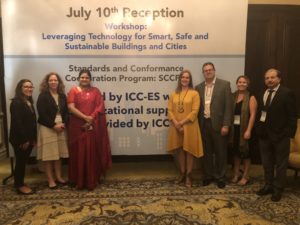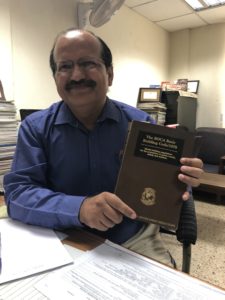
ICC leads conversation about smart and sustainable cities in India
Judy Zakreski, vice president of Global Services for the International Code Council, and Ryan Colker, vice president of Innovation for the Code Council, recently returned from New Delhi, India, where they presented a workshop — Leveraging Technology for Smart, Safe and Sustainable Buildings and Cities — on July 10–11, 2019, that included presentations by thought leaders and regulators from the United States and India. The workshop was one in a series led by the American National Standards Institute and sponsored by the U.S. Trade and Development Agency under the U.S.–India Standards and Conformance Cooperation Program with local sponsorship from the Confederation of Indian Industry.

The focus of the workshop was on safe, sustainable and resilient buildings as the underpinning of “smart-ready” cities and the prerequisite to the effective implementation and utilization of “smart” technologies. Implementation and enforcement of strong building codes was widely discussed as a challenge faced by many jurisdictions, with product evaluation, personnel certification and accreditation offered as effective tools to employ in this area.
The workshop topics extended to technologies, such as BIM (building information modeling) that can help to make the built environment smarter, as well as establish the basis for increased interoperability within each building and between buildings and a city’s infrastructure. Presentations followed by thought leaders, technologists and research institutes about emerging technologies that can create interoperative cities of the future. The workshop concluded with a proposed definition of a smart city provided by Colker: “A community that meets the social, environmental, economic and infrastructural needs of its residents through the coordinated and integrated use of data and technology.” This discussion was globally relevant and will likely lead to some additional undertakings by the Code Council as it continues to be at the forefront of the building innovation discussion.

In India, which is a federalist system like the United States, the Bureau of Indian Standards has developed a strong National Building Code (NBC) that requires adoption and implementation by each of the 29 states. The NBC was initially developed in 1970 following review of building codes developed globally, including those of the Code Council’s predecessor organizations. The NBC is not compulsory until it is adopted and implemented by a state government. The Indian Bureau of Energy Efficiency has developed a separate Energy Conservation Building Code that has been integrated into the most recent NBC but has also been adopted and implemented separately by 13 states. Having the opportunity to engage with regulators and stakeholders in India in this type of forum provides greater understanding of the areas in which engagement can lead to increased recognition of the codes and standards used in the U.S. and India so that market access for building materials and global collaboration for building safety can be improved.








